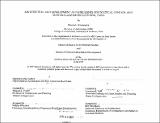| dc.contributor.advisor | William L. Porter, Lawrence J. Vale. | en_US |
| dc.contributor.author | Srivastava, Manish | en_US |
| dc.contributor.other | Massachusetts Institute of Technology. Dept. of Architecture. | en_US |
| dc.date.accessioned | 2012-04-26T18:35:46Z | |
| dc.date.available | 2012-04-26T18:35:46Z | |
| dc.date.copyright | 1997 | en_US |
| dc.date.issued | 1997 | en_US |
| dc.identifier.uri | http://hdl.handle.net/1721.1/70288 | |
| dc.description | Thesis (M.S.)--Massachusetts Institute of Technology, Dept. of Architecture, 1997. | en_US |
| dc.description | Includes bibliographical references (leaves 188-195). | en_US |
| dc.description.abstract | A critical inquiry was undertaken to explore the role that architecture, development, architectural criticism, and urban intervention played, as representational and ideological tools, in the process of British colonial formation in Lucknow, from 1765 to 1858. Results show: (1) Architecture and development played a crucial role in annexation of Lucknow by the British in 1856, (2) Orientalist architectural criticism was an instrument to justify the annexation of the city and the deposition of its rulers, (3) the British government used urban intervention and massive urban surgery to establish their political and social control over Lucknow, and (4) through the representation of the pre-colonial city as an impediment to progress and change, the British colonial enterprise permanently destroyed the indigenous socio-political economy and culture that symbolized the flouring city between 1765 and 1858. Since then, Lucknow has yet to recover. | en_US |
| dc.description.statementofresponsibility | by Manish Srivastava. | en_US |
| dc.format.extent | 195 leaves | en_US |
| dc.language.iso | eng | en_US |
| dc.publisher | Massachusetts Institute of Technology | en_US |
| dc.rights | M.I.T. theses are protected by
copyright. They may be viewed from this source for any purpose, but
reproduction or distribution in any format is prohibited without written
permission. See provided URL for inquiries about permission. | en_US |
| dc.rights.uri | http://dspace.mit.edu/handle/1721.1/7582 | en_US |
| dc.subject | Architecture. | en_US |
| dc.title | Architecture and development as instruments for political control and marginalization in Lucknow, India | en_US |
| dc.type | Thesis | en_US |
| dc.description.degree | M.S. | en_US |
| dc.contributor.department | Massachusetts Institute of Technology. Department of Architecture | |
| dc.identifier.oclc | 37707150 | en_US |
